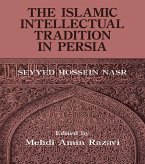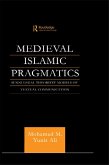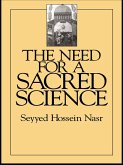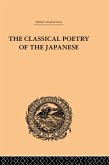John Inglis
Medieval Philosophy and the Classical Tradition (eBook, ePUB)
In Islam, Judaism and Christianity
37,95 €
37,95 €
inkl. MwSt.
Sofort per Download lieferbar

19 °P sammeln
37,95 €
Als Download kaufen

37,95 €
inkl. MwSt.
Sofort per Download lieferbar

19 °P sammeln
Jetzt verschenken
Alle Infos zum eBook verschenken
37,95 €
inkl. MwSt.
Sofort per Download lieferbar
Alle Infos zum eBook verschenken

19 °P sammeln
John Inglis
Medieval Philosophy and the Classical Tradition (eBook, ePUB)
In Islam, Judaism and Christianity
- Format: ePub
- Merkliste
- Auf die Merkliste
- Bewerten Bewerten
- Teilen
- Produkt teilen
- Produkterinnerung
- Produkterinnerung

Bitte loggen Sie sich zunächst in Ihr Kundenkonto ein oder registrieren Sie sich bei
bücher.de, um das eBook-Abo tolino select nutzen zu können.
Hier können Sie sich einloggen
Hier können Sie sich einloggen
Sie sind bereits eingeloggt. Klicken Sie auf 2. tolino select Abo, um fortzufahren.

Bitte loggen Sie sich zunächst in Ihr Kundenkonto ein oder registrieren Sie sich bei bücher.de, um das eBook-Abo tolino select nutzen zu können.
An initial chapter on the history of Islamic philosophy sets the stage for sixteen articles on issues across the three traditions. The goal is to see the Islamic tradition in its own richness and complexity as the context of most Jewish intellectual work.
- Geräte: eReader
- mit Kopierschutz
- eBook Hilfe
- Größe: 1.88MB
Andere Kunden interessierten sich auch für
![The Islamic Intellectual Tradition in Persia (eBook, ePUB) The Islamic Intellectual Tradition in Persia (eBook, ePUB)]() Mehdi Amin Razavi AminrazaviThe Islamic Intellectual Tradition in Persia (eBook, ePUB)51,95 €
Mehdi Amin Razavi AminrazaviThe Islamic Intellectual Tradition in Persia (eBook, ePUB)51,95 €![Medieval Islamic Pragmatics (eBook, ePUB) Medieval Islamic Pragmatics (eBook, ePUB)]() Muhammad M. Yunis AliMedieval Islamic Pragmatics (eBook, ePUB)46,95 €
Muhammad M. Yunis AliMedieval Islamic Pragmatics (eBook, ePUB)46,95 €![The Biographical Tradition in Sufism (eBook, ePUB) The Biographical Tradition in Sufism (eBook, ePUB)]() Jawid A. MojaddediThe Biographical Tradition in Sufism (eBook, ePUB)51,95 €
Jawid A. MojaddediThe Biographical Tradition in Sufism (eBook, ePUB)51,95 €![The Need For a Sacred Science (eBook, ePUB) The Need For a Sacred Science (eBook, ePUB)]() Seyyed Hossein NasrThe Need For a Sacred Science (eBook, ePUB)54,95 €
Seyyed Hossein NasrThe Need For a Sacred Science (eBook, ePUB)54,95 €![Selected Poems from the Divani Shamsi Tabriz (eBook, ePUB) Selected Poems from the Divani Shamsi Tabriz (eBook, ePUB)]() Reynold A. NicholsonSelected Poems from the Divani Shamsi Tabriz (eBook, ePUB)93,95 €
Reynold A. NicholsonSelected Poems from the Divani Shamsi Tabriz (eBook, ePUB)93,95 €![The Classical Poetry of the Japanese (eBook, ePUB) The Classical Poetry of the Japanese (eBook, ePUB)]() Basil Hall ChamberlainThe Classical Poetry of the Japanese (eBook, ePUB)23,95 €
Basil Hall ChamberlainThe Classical Poetry of the Japanese (eBook, ePUB)23,95 €![Domestic Violence in Asia (eBook, ePUB) Domestic Violence in Asia (eBook, ePUB)]() Emma FuluDomestic Violence in Asia (eBook, ePUB)52,95 €
Emma FuluDomestic Violence in Asia (eBook, ePUB)52,95 €-
-
-
An initial chapter on the history of Islamic philosophy sets the stage for sixteen articles on issues across the three traditions. The goal is to see the Islamic tradition in its own richness and complexity as the context of most Jewish intellectual work.
Dieser Download kann aus rechtlichen Gründen nur mit Rechnungsadresse in A, B, BG, CY, CZ, D, DK, EW, E, FIN, F, GR, HR, H, IRL, I, LT, L, LR, M, NL, PL, P, R, S, SLO, SK ausgeliefert werden.
Produktdetails
- Produktdetails
- Verlag: Taylor & Francis eBooks
- Seitenzahl: 328
- Erscheinungstermin: 9. Oktober 2005
- Englisch
- ISBN-13: 9781135790875
- Artikelnr.: 42726614
- Verlag: Taylor & Francis eBooks
- Seitenzahl: 328
- Erscheinungstermin: 9. Oktober 2005
- Englisch
- ISBN-13: 9781135790875
- Artikelnr.: 42726614
- Herstellerkennzeichnung Die Herstellerinformationen sind derzeit nicht verfügbar.
John Inglis is Associate Professor of Philosophy at the University of Dayton.
Notes on Contributors Acknowledgements Introduction: Towards a Balanced
Historiography of Medieval Philosophy John Inglis Section One: Historical
Context 1. Medieval Islamic Philosophy and the Classical Tradition Micheal
E. Marmura Section Two: Philosophy 2. A Philosophical Odyssey: Ghazzali's
Intentions of the Philosophers Gabriel Said Reynolds 3. The Relationship
between Averroes and al-Ghazali: as it presents itself in Averroes' Early
Writings, especially in his Commentary on al-Ghazali's al-Mustasfa Frank
Griffel 4. Al-Ghazali and Halevi on Philosophy and the Philosophers Barry
S. Kogan Section Three: Neoplatonism 5. Projection and Time in Proclus D.
Gregory MacIsaac 6. Forms of Knowledge in the Arabic Plotinus Peter Adamson
7. Secundum rei vim vel secundum cognoscentium facultatem : Knower and
Known in the Consolation of Philsosophy pf Boethius and the proslogion of
Anselm Wayne J. Hankey 8. Proclean 'Remaining' and Avicenna on Existence as
Accident: Neoplatonic Methodology and a Defense of 'Pre-Existing' Essences
Sarah Pessin 9. Augustine vs Plotinus: The Uniqueness of the Vision at
Ostia Thomas Williams Section Four: Creation 10. Infinite Power and
Plenitude: Two Traditions on the Necessity of the Eternal Taneli Kukkonen
11. The Challenge to Medieval Christian Philosophy: Relating Creator to
Creatures David B. Burrell, C.S.C. Section Five: Virtue 12. Three Kinds of
Objectivity Jonathan Jacobs 13. On Defining Maimonides' Aristotelianism
Daniel H. Frank 14. Porphyry, Bonaventure and Thomas Aquinas: A Neoplatonic
Hierarchy of Virtues and Two Christian Appropriations Joshua P. Hochschild
Section Six: The Latin Reception 15. William of Auvergne and the
Aristotelians: The Nature of a Servant Michael Miller 16. Is God a 'What'?
Avicenna, William of Auvergne, and Aquinas on the Divine Essence John P.
Rosheger 17. Maimonides and Roger Bacon: Did Roger Bacon Read Maimonides?
Jeremiah Hackett Index
Historiography of Medieval Philosophy John Inglis Section One: Historical
Context 1. Medieval Islamic Philosophy and the Classical Tradition Micheal
E. Marmura Section Two: Philosophy 2. A Philosophical Odyssey: Ghazzali's
Intentions of the Philosophers Gabriel Said Reynolds 3. The Relationship
between Averroes and al-Ghazali: as it presents itself in Averroes' Early
Writings, especially in his Commentary on al-Ghazali's al-Mustasfa Frank
Griffel 4. Al-Ghazali and Halevi on Philosophy and the Philosophers Barry
S. Kogan Section Three: Neoplatonism 5. Projection and Time in Proclus D.
Gregory MacIsaac 6. Forms of Knowledge in the Arabic Plotinus Peter Adamson
7. Secundum rei vim vel secundum cognoscentium facultatem : Knower and
Known in the Consolation of Philsosophy pf Boethius and the proslogion of
Anselm Wayne J. Hankey 8. Proclean 'Remaining' and Avicenna on Existence as
Accident: Neoplatonic Methodology and a Defense of 'Pre-Existing' Essences
Sarah Pessin 9. Augustine vs Plotinus: The Uniqueness of the Vision at
Ostia Thomas Williams Section Four: Creation 10. Infinite Power and
Plenitude: Two Traditions on the Necessity of the Eternal Taneli Kukkonen
11. The Challenge to Medieval Christian Philosophy: Relating Creator to
Creatures David B. Burrell, C.S.C. Section Five: Virtue 12. Three Kinds of
Objectivity Jonathan Jacobs 13. On Defining Maimonides' Aristotelianism
Daniel H. Frank 14. Porphyry, Bonaventure and Thomas Aquinas: A Neoplatonic
Hierarchy of Virtues and Two Christian Appropriations Joshua P. Hochschild
Section Six: The Latin Reception 15. William of Auvergne and the
Aristotelians: The Nature of a Servant Michael Miller 16. Is God a 'What'?
Avicenna, William of Auvergne, and Aquinas on the Divine Essence John P.
Rosheger 17. Maimonides and Roger Bacon: Did Roger Bacon Read Maimonides?
Jeremiah Hackett Index
Notes on Contributors Acknowledgements Introduction: Towards a Balanced
Historiography of Medieval Philosophy John Inglis Section One: Historical
Context 1. Medieval Islamic Philosophy and the Classical Tradition Micheal
E. Marmura Section Two: Philosophy 2. A Philosophical Odyssey: Ghazzali's
Intentions of the Philosophers Gabriel Said Reynolds 3. The Relationship
between Averroes and al-Ghazali: as it presents itself in Averroes' Early
Writings, especially in his Commentary on al-Ghazali's al-Mustasfa Frank
Griffel 4. Al-Ghazali and Halevi on Philosophy and the Philosophers Barry
S. Kogan Section Three: Neoplatonism 5. Projection and Time in Proclus D.
Gregory MacIsaac 6. Forms of Knowledge in the Arabic Plotinus Peter Adamson
7. Secundum rei vim vel secundum cognoscentium facultatem : Knower and
Known in the Consolation of Philsosophy pf Boethius and the proslogion of
Anselm Wayne J. Hankey 8. Proclean 'Remaining' and Avicenna on Existence as
Accident: Neoplatonic Methodology and a Defense of 'Pre-Existing' Essences
Sarah Pessin 9. Augustine vs Plotinus: The Uniqueness of the Vision at
Ostia Thomas Williams Section Four: Creation 10. Infinite Power and
Plenitude: Two Traditions on the Necessity of the Eternal Taneli Kukkonen
11. The Challenge to Medieval Christian Philosophy: Relating Creator to
Creatures David B. Burrell, C.S.C. Section Five: Virtue 12. Three Kinds of
Objectivity Jonathan Jacobs 13. On Defining Maimonides' Aristotelianism
Daniel H. Frank 14. Porphyry, Bonaventure and Thomas Aquinas: A Neoplatonic
Hierarchy of Virtues and Two Christian Appropriations Joshua P. Hochschild
Section Six: The Latin Reception 15. William of Auvergne and the
Aristotelians: The Nature of a Servant Michael Miller 16. Is God a 'What'?
Avicenna, William of Auvergne, and Aquinas on the Divine Essence John P.
Rosheger 17. Maimonides and Roger Bacon: Did Roger Bacon Read Maimonides?
Jeremiah Hackett Index
Historiography of Medieval Philosophy John Inglis Section One: Historical
Context 1. Medieval Islamic Philosophy and the Classical Tradition Micheal
E. Marmura Section Two: Philosophy 2. A Philosophical Odyssey: Ghazzali's
Intentions of the Philosophers Gabriel Said Reynolds 3. The Relationship
between Averroes and al-Ghazali: as it presents itself in Averroes' Early
Writings, especially in his Commentary on al-Ghazali's al-Mustasfa Frank
Griffel 4. Al-Ghazali and Halevi on Philosophy and the Philosophers Barry
S. Kogan Section Three: Neoplatonism 5. Projection and Time in Proclus D.
Gregory MacIsaac 6. Forms of Knowledge in the Arabic Plotinus Peter Adamson
7. Secundum rei vim vel secundum cognoscentium facultatem : Knower and
Known in the Consolation of Philsosophy pf Boethius and the proslogion of
Anselm Wayne J. Hankey 8. Proclean 'Remaining' and Avicenna on Existence as
Accident: Neoplatonic Methodology and a Defense of 'Pre-Existing' Essences
Sarah Pessin 9. Augustine vs Plotinus: The Uniqueness of the Vision at
Ostia Thomas Williams Section Four: Creation 10. Infinite Power and
Plenitude: Two Traditions on the Necessity of the Eternal Taneli Kukkonen
11. The Challenge to Medieval Christian Philosophy: Relating Creator to
Creatures David B. Burrell, C.S.C. Section Five: Virtue 12. Three Kinds of
Objectivity Jonathan Jacobs 13. On Defining Maimonides' Aristotelianism
Daniel H. Frank 14. Porphyry, Bonaventure and Thomas Aquinas: A Neoplatonic
Hierarchy of Virtues and Two Christian Appropriations Joshua P. Hochschild
Section Six: The Latin Reception 15. William of Auvergne and the
Aristotelians: The Nature of a Servant Michael Miller 16. Is God a 'What'?
Avicenna, William of Auvergne, and Aquinas on the Divine Essence John P.
Rosheger 17. Maimonides and Roger Bacon: Did Roger Bacon Read Maimonides?
Jeremiah Hackett Index







